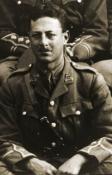
War Memorial
| 2nd Lieutenant Cyril SPARTALI | |
|
8th (Service) Battalion Royal Berkshire Regiment Date of birth: 10th July 1888 Date of death: 13th October 1915 Killed in action aged 27 Commemorated on the Loos Memorial Panels 93 to 95 |

|
| Cyril Spartali was one of twins born at "The Elms", West Worthing in Sussex at 11.15am on the 10th of July 1888 the son of Demetrius Michael Spartali, a merchant, and Virginia (nee Ralli later Ellice-Clarke) Spartali of 18 Pont Street, London. He was christened on the 6th of September 1888 at the Greek Orthodox Cathedral of Saint Sophia, Moscow Road, Bayswater in London. He was educated at Hazelwood School until April 1902. On leaving the school the magazine wrote of him: - "...goes to Harrow. He is a good musician and excellent hockey player." He went on to Harrow School where he was in Mr Stogton's House from April 1902 to April 1904. He was a member of the Officer Training Corps. On the 25th of June 1907 he was admitted as a pensioner to Trinity College Cambridge. He went to work in India for Ralli Brothers but contracted typhoid fever and returned to England where he was recovering when war broke out. He enlisted at 10 Stone Building Lincoln's Inn as Private 2127 in the Inns of Court Officer Training Corps on the 19th of November 1914 and was posted to Berkhamsted for training. He had undergone a medical examination on the 2nd of November 1915 where is was recorded that he was 5 feet seven and a quarter of an inch tall. He applied for a commission on the 6th of January 1915 and was commissioned as a 2nd Lieutenant in the newly formed 8th Battalion of the Royal Berkshire Regiment on the 19th of January 1915. He embarked for France with his battalion at Southampton on the 7th of August 1915, landing at Le Havre the following day. While in the rear areas he proved to be extremely useful to his company in dealing with the locals as he was a French scholar At 11.30pm on the 12th of October 1915 the 8th Battalion filed into trenches to the south-west of Hulluch astride the Hulluch-Grenay Road. Their objective for the following day was 300 yards away, being the newly dug first German line running northwards along the Lens Road. At precisely 1pm on the 13th chlorine gas was released from the British trenches, this continued until 1.50pm. At this time smoke bombs were thrown into no man's land and, with the wind being favourable, the gas and smoke was carried towards the German positions. At 1.50pm the artillery support stopped and wire cutting parties accompanied by bombers, moved forward under cover of the smoke. Hostile machine gun fire was heard on the right of the Berkshire advance. At 2pm the first two infantry company went forward but of these only six men are known to have reached the objective, the rest being enfiladed by the machine guns from the position known as the “Chalk Pits”. At 2.10 two platoons of the supporting companies were sent forward but word came back from their officer that the smoke was thinning and his men had advanced only 75 yards. About fifteen of these men crossed the road between the two lines and came under rifle fire and a shower of grenades from the German front line which thankfully fell 10 yards short of the Berkshires. At 2.20pm the rest of the battalion went forward but met with no success either. The survivors remained there until dark when they crawled back to their starting trenches. A Private in the battalion wrote home later: - ”It was the same old cry, “Come on the Berks” and over the top we went. When we got over, there was something waiting for us in the shape of German machine guns. They were continually sweeping the ground with them from one end of our line to the other. They fire from 500 to 600 bullets per minute so you can see it was pretty warm. When I got to within 20 yards of the German trench it was a bit too warm. I dropped down into a shell hole. There I had to lay, not daring to move so much as an eye lash, or it would have been my last move as there were snipers all around. To make it worse they had spotted me, for they had taken several pots in my direction, but I kept too low for them. I had to stay there for four hours ‘till it got dark so that I could crawl back to our trench. When I did move I thought my back was going to break I was so cramped up. It took me two hours to cover 150 yards but thank God I got back safely.” It was during this attack that Cyril Spartali was killed. His mother received the following telegram dated the 16th of October 1915: - "Deeply regret to inform you that 2 Lieut. C. Spartali Berkshire Regt was killed in action Oct 13th. Lord Kitchener expresses his sympathy." A brother officer wrote to his mother:- “I am sure you must feel very proud to know that your son died an honourable death, leading his company regardless of the danger around him, only thinking of the honour of his battalion and of the work he had to do that day.” Another wrote:- “All his men loved him and would have followed him anywhere. He was always cool and never afraid.” He is commemorated on the war memorial at Harrow School, on the memorial in the chapel at Trinity College Cambridge and on the memorial at Otham in Kent. There is a memorial to him and his brother at the Greek Orthodox Cathedral of Saint Sophia. His brother, 2nd Lieutenant Michael Spartali 2nd Battalion South Wales Borderers, was killed in action on the 15th of June 1915. |
|
| Went on to Harrow School |
Back